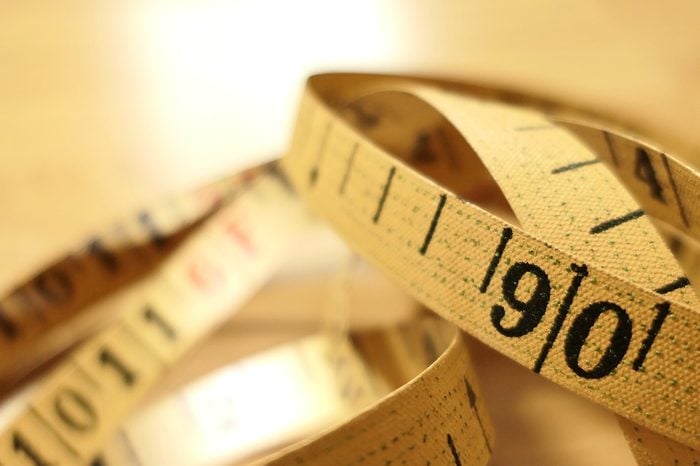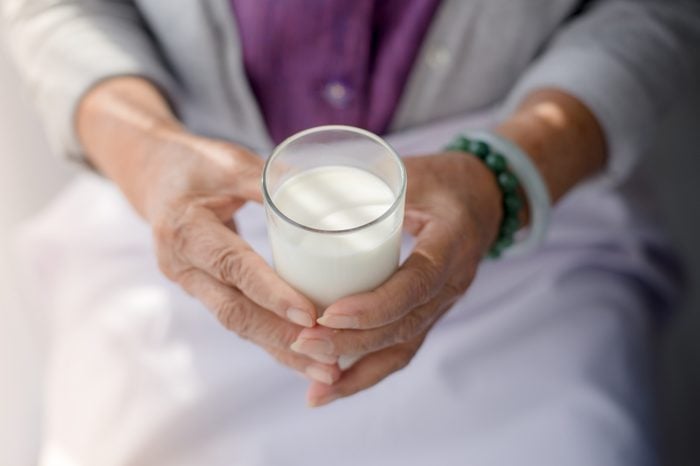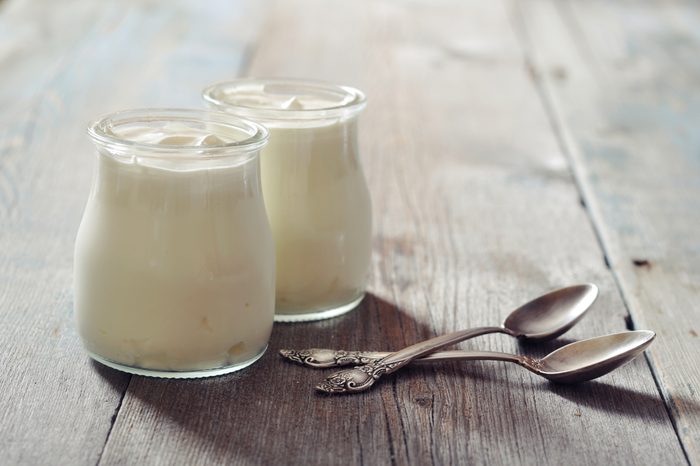Your bones could get weaker
Milk is chock full of calcium, protein, vitamin D, and other minerals important to building strong bones. Most of your bone-building takes place in your childhood and teenage years, but you never outgrow the need to keep your bones strong. If you’re on a dairy-free diet, it’s important to find a way to replace those lost nutrients, says Kelly Pritchett, PhD, RD, assistant professor of nutrition and exercise science at Central Washington University in Ellensburg, WA. “Milk has been referred to as being important for bone health because it contains both calcium and vitamin D,” she says. “However, there are other sources of food containing both of these. In fact, our best source of vitamin D is from the sun—food isn’t a great source.” Get your daily doses of calcium from leafy greens, fortified orange juice or almond milk, and broccoli—and know these clear signs you’re not getting enough calcium.

You should pay more attention to your blood pressure
Even though its calcium gets most of the hype, milk is also packed with potassium, which helps the body fight the potential blood pressure-raising effects of sodium. The DASH diet, which lowers blood pressure effectively without medication, calls for people to increase fruits, veggies, and dairy, says Isabel Maples, RDN, a Washington, DC-based spokesperson for the Academy of Nutrition and Dietetics. “People who just increased fruits and vegetables got a reduction in blood pressure, but when they mixed it with three servings of dairy, that’s when we saw big jumps,” she says. “It’s not just what you take away, but what you add to bolster health effects of better blood pressure.” Here’s what you need to know about the DASH Diet.

Your weight might change
Be mindful if you’re developing a dairy-free diet as a weight-loss tactic. While dairy products can add major calories (think: full-fat cheese and ice cream), some studies have shown that milk promotes fullness and helps maintain a healthy weight. Among the findings in a recent review of studies published in 2016 in the journal Calcified Tissue International: Increasing dairy consumption to recommended daily intake levels in adults who do not follow any calorie-restricted diet had a small effect on weight loss, but also a decrease in fat mass and waist circumference and an increase in lean body mass. Don’t miss these dairy myths you should stop believing.

Your skin might clear up
A review of studies published in 2018 in the journal Nutrients found that 7- to 30-year-olds who consumed any kind of dairy–whole milk, skim milk, yogurt–had a greater chance of developing acne compared to those who followed a dairy-free diet, regardless of the amount or frequency. Still, the American Academy of Dermatology says the evidence isn’t strong enough to recommend cutting out foods to clear your skin.

Your lactose intolerance could feel worse
If you’re lactose intolerant (see if your symptoms line up with these symptoms of lactose intolerance), you’re missing the enzyme that normally breaks down milk sugar, which is why you could have stomach issues when you have dairy products. But if you do start on a dairy-free diet, you’ll actually reduce symptoms by increasing the healthy bacteria in your gut. “If someone is lactose intolerant, even severely, but still consumes dairy food, the body increases bacteria that turn around and breaks that lactose down,” says Maples. You likely can still handle two servings of dairy a day. Just space it out into smaller portions throughout the day. And if milk is your preferred source of dairy, drink it with food so it doesn’t digest as quickly.

You could feel less bloated
If you’re someone that blows up like a balloon after a bowl of ice cream, a slice of pizza, or even just a glass of milk, a dairy-free diet might be the solution. Usually, if your bloating is severe, it’s caused by lactose intolerance. Of course, there are pros and cons of going dairy-free to relieve yourself of lactose intolerance. But if you’re ditching dairy for good (meaning absolutely no more snacking on small servings), you’ll feel better and far less bloated.

You’ll want to stock up on probiotics
Probiotics, which regulate your gut flora (read: keep you regular), are plentiful in dairy products like yogurt, kefir, and soft cheese. These little microbes have multitudes of benefits, but if you’re dead set on a dairy-free diet, you can still get probiotics from tempeh, sauerkraut, kombucha, and pickles (hint: fermentation = lots of probiotics). Next, learn about more surprising calcium sources for those who don’t eat dairy.
